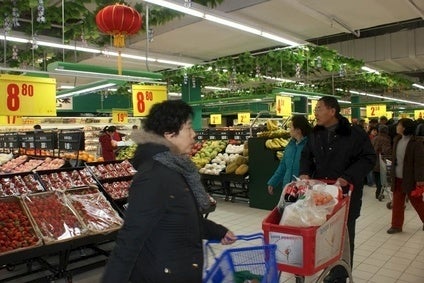Two significant announcements this week further underlined how the impact of China's recent economic slowdown is affecting companies in our sector.
Infant formula giant Mead Johnson lowered its forecasts for annual sales and earnings after issues in China and other emerging markets hit the group in the second quarter.
Mead Johnson said it is enjoying "strong sales" from a line of recently-launched imported products but the company has seen its domestically-manufactured come under pressure. That is due, in part, to the continued preference among some cautious Chinese consumers for formula made outside the country.
However, the recent easing in China's economic growth has hit demand across a number of sectors, including infant formula. Mead Johnson said the slowdown had fed through to discounting in China's infant formula category
Kasper Jakobsen, Mead Johnson's president and CEO, expressed some positivity about the outlook for the business in China, pointing to the recently-launched lines and the company's efforts in the country's burgeoning e-commerce channel.
"As our new initiatives will make an ever larger contribution to our business, I am confident that we will be recording sequential sales growth in China by the end of the year," Jakobsen said.

US Tariffs are shifting - will you react or anticipate?
Don’t let policy changes catch you off guard. Stay proactive with real-time data and expert analysis.
By GlobalDataDairy has been another category affected and that has been a factor in Fonterra's decision to review its operations.
The first publicly-announced result of that review came this week, with the New Zealand dairy giant saying it will cut over 500 jobs.
Alongside Russia's restrictions on imports of dairy products in retaliation for western sanctions on Moscow, as well as strong global production, slowing demand in China has contributed to a glut in supply of dairy commodities. China has cut back on demand for dairy imports as it works through existing stocks.
All this has combined to weigh on global prices for dairy commodities and Fonterra, the world's largest dairy exporter, has reacted to protect profits by looking at costs. And, as Fonterra's review continues, the company has indicated there could be more cuts.
Beijing announced GDP figures for the second quarter this week – and the numbers beat expectations. China's economy grew 7% year-on-year, matching the rate in the first three months of the year and a touch higher than analyst forecasts of 6.8%.
But not everyone was convinced. "You only have to look at commodity prices to see that there's a disconnect with what the official Chinese data is showing and what really the demand in the underlying economy is having for things like raw materials," Adam Myers, senior market strategist at Credit Agricole, told CNBC.
The announcements from Fonterra and Mead Johnson follow a downbeat assessment of its performance in China from Hershey. Last month, Hershey again cut its forecast for 2015 sales but this time announced "productivity" initiatives that will lead to it axing around 300 jobs. Hershey cited weakness in China, revealing its performance in the country over the past two months was "below expectations". The company said that it had fallen foul of weak macro-economic conditions and changing consumption patterns as shoppers switch to smaller formats and e-commerce.
Not every company is struggling. Last week, PepsiCo cited a "high single-digit" rise in organic sales in China in the second quarter of the year.
Two weeks ago, McCormick & Co. reported growth from its consumer-facing business in China. "We recognise that there has been some slowdown in economic growth in China but our categories continue to do well and our brands in particular had really broad-based growth in this quarter, and we don't really see any change in that trend," president and COO Lawrence Kurzius told analysts.
Nevertheless, investors are paying plenty of attention to China. The market will remain a key part of emerging market strategies at a number of companies and so it should. However, slowing growth, weakening consumer demand and increasing competition is focusing minds.
On Thursday, Unilever and Mead Johnson announce their second-quarter results. Expect plenty of questions for both companies on China.





